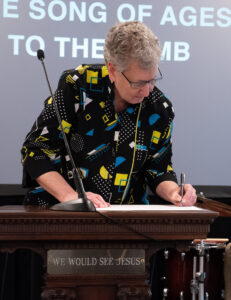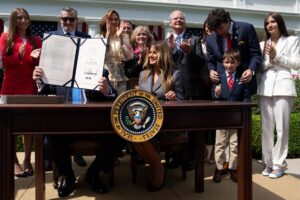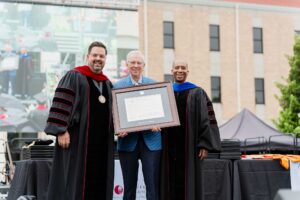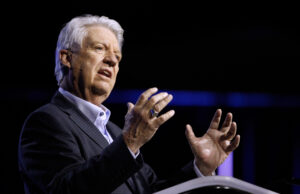
NASHVILLE, Tenn. (BP)–After eight months of discussion and planning, delegates from the conservative American Baptist Churches Pacific Southwest region voted April 29 formally to sever all ties with their parent denomination. The vote clears the way for the region’s board to complete the separation at its next gathering May 11.
Delegates from the region’s 300 churches gathered in seven locations throughout California, Nevada, Arizona and Hawaii to cast votes, and approved the move by a vote of 1,125 to 209. The region had already ceased sending funds to the 1.5 million-member American Baptist Churches (USA) at the close of 2005.
At issue is the failure of the General Board of the American Baptist Churches (USA) to enforce its policy statements on homosexuality. While the denomination adopted statements on the incompatibility of Christianity and the homosexual lifestyle in 1984 and 1992, the General Board in 1993 adopted a resolution that called for “continuing dialogue on human sexuality.” The statement seemed to many conservative American Baptists to open the door to homosexuality-friendly churches and associations.
The board of the Pacific Southwest region recommended full withdrawal from its covenant relationship with the denomination because “deep differences of theological convictions and values between the American Baptist Churches of the Pacific Southwest (ABCPSW) and the American Baptist Churches in the USA (ABCUSA) are understood by the Board of Directors of the ABCPSW as irreconcilable,” the region’s leadership said in a statement issued after the vote.
“While the Board had authority on its own to withdraw from the national denomination, it called for a special meeting of delegates from churches ‘to provide the Board with the guidance and input it needs to make a responsible and informed decision,'” the statement said.
In the past two decades several groups, such as the Evergreen Association in Washington and the Rochester-Genesee region of New York, have accepted homosexuality-friendly churches from within their own regions. But they have also accepted as members churches disassociated from other American Baptist regions over the issue of homosexuality.
The Pacific Southwest region’s board has repeatedly cited the fact that the General Board has allowed the actions to take place as evidence of a soft stance on homosexuality. The General Board has refused to intervene, citing Baptist freedom and local church autonomy.
And the Pacific Southwest region is not alone in its challenge to the effectiveness of the General Board and its policy statements on homosexuality. In October 2005, a group calling itself West Virginia Baptists for Biblical Truth put forth a resolution at its convention calling for 474 American Baptist churches with more than 16,000 members in that state to sever all ties with the national denomination over the issue.
The Associated Press reported that the resolution, which cited the ordination of homosexual ministers and the affirmation of the homosexual lifestyle by some churches, failed by a vote of 391-325. However, a resolution which would have offered an affirmation of the national denomination also was rejected by a much larger margin. That resolution was proposed by a church loyal to American Baptist Churches (USA).
American Baptists in the Indiana-Kentucky region also have proposed a change in the denomination’s rules and bylaws that would not allow churches disassociated from one region over the issue of homosexuality to be accepted in another. The homosexuality-friendly Rochester-Genesee region, comprised of 34 churches, opposes the move and has issued a statement calling the plan a move toward a “creedal denomination.”
“Such amendments to our Bylaws, Standing Rules, Statements of Agreement, and Covenant of Relationships would permanently alter our denominational identity and leave us defenseless against additional doctrinal tests in the future,” the statement from the New York region said. The statement also said that the proposal “exploits division around homosexuality.”
“Some religious leaders on the far right, sensing that homosexuality is a ‘wedge’ issue that can be exploited, have begun an effort to purge the denomination of ‘heretical’ churches and clergy in favor of a denomination with a ‘binding Confession of Faith,'” the statement said.
In a statement issued for the denomination’s headquarters in Valley Forge, Pa., the leadership of the denomination claimed that only half of the member churches of the Pacific Southwest region were represented at the vote to separate April 29. It also claimed that a “significant number of churches” in the Pacific Southwest region “wish to remain American Baptist” and would not leave.
“They will form an Association of American Baptist Churches immediately if the region board votes on May 11 to break the covenant,” the statement from the denomination’s headquarters said.
General Secretary Roy Medley expressed sorrow that the Pacific Southwest region had voted to withdraw. “Though not uncommon in Baptist life, such actions grieve the heart of God and our Lord Jesus Christ,” Medley said. He added that the denomination had “hoped and made many efforts to keep the unity of the Spirit through the bond of peace.”
Medley said that Samuel Chetti, executive minister of the Los Angeles Baptist City Mission Society, would give “watch-care and oversight” to churches that form a new association.
The acceptance of homosexuality-friendly churches in the American Baptist Churches (USA) was cited as a primary reason Southern Baptists severed ties with the Baptist World Alliance in 2005. The BWA refused to acknowledge Southern Baptists’ concerns about the denomination’s stance on homosexuality and its failure to discipline congregations that accepted unrepentant homosexuals as members; both were problems going back some 14 years when a group called the Association of Welcoming and Affirming Baptists appeared in American Baptist life.
–30–
















